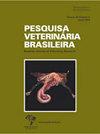丹毒皮肤病变宰猪的解剖病理学和免疫组织化学的应用
IF 0.8
4区 农林科学
Q3 VETERINARY SCIENCES
引用次数: 0
摘要
摘要:猪丹毒是一种世界性的疾病,对猪造成经济损失,是一种职业性人畜共患疾病。据估计,30%至50%的猪是携带者,应激可使临床疾病的出现易感。对屠宰猪丹毒的诊断对病理学家来说是一个挑战,因为屠宰场的常规程序——烫伤和脱毛——会产生组织学伪影,往往使最终诊断变得不可能。本研究描述了解剖病理方面和评估使用免疫组织化学作为诊断工具在这些情况下。对43例屠宰猪丹毒进行了分析。肉眼可见,皮肤病变特征性为粉红色、红色或紫色凸起的菱形、矩形或方形病变(“菱形皮肤”)。组织学上,真皮和皮下组织出现化脓性血管炎、汗腺炎和毛囊炎,血管壁变性坏死、血栓形成和多灶性坏死。所有病例均出现化脓性血管炎和血管壁损伤,严重程度不同。免疫组化技术是一种有效的辅助诊断方法,免疫染色阳性率为93%。在大多数病例中,我们观察到轻度免疫染色(57.5%),中度免疫染色(22.5%),标记免疫染色(20%)。本文章由计算机程序翻译,如有差异,请以英文原文为准。
Anatomopathological aspects and the use of immunohistochemistry in slaughter pigs with cutaneous lesions of erysipelas
ABSTRACT: Swine erysipelas is a disease of worldwide distribution, responsible for causing economic losses in swine and considered an occupational zoonotic disease. It is estimated that 30% to 50% of pigs are carriers and stress can predispose the appearance of clinical disease. The diagnosis of erysipelas in slaughter pigs becomes a challenge for pathologists, since scalding and dehairing, routine procedures in slaughterhouses, generate histological artifacts that often make the final diagnosis impossible. This study describes the anatomopathological aspects and evaluate the use of immunohistochemistry as a diagnostic tool in these cases. Forty-three cases of erysipelas in slaughter pigs were analyzed. Grossly, the cutaneous lesions were characteristic pink, red, or purple raised rhomboid, rectangular or square lesions (“diamond skin”). Histologically, in the dermis and subcutaneous tissue, there were suppurative vasculitis, hidradenitis and folliculitis, as well as degeneration and necrosis of the vessel wall, thrombosis and multifocal areas of necrosis. Suppurative vasculitis and damage to the blood vessel wall were observed in all cases, with varying degrees of severity. The immunohistochemical technique proved to be an effective complementary method of diagnosis, with positive immunostaining in 93%. In most cases, we observed mild immunostaining (57.5%), moderate in 22.5% and marked in 20%.
求助全文
通过发布文献求助,成功后即可免费获取论文全文。
去求助
来源期刊

Pesquisa Veterinaria Brasileira
农林科学-兽医学
CiteScore
1.30
自引率
16.70%
发文量
41
审稿时长
9-18 weeks
期刊介绍:
Pesquisa Veterinária Brasileira - Brazilian Journal of Veterinary Research (http://www.pvb.com.br), edited by the Brazilian College of Animal Pathology in partnership with the Brazilian Agricultural Research Organization (Embrapa) and in collaboration with other veterinary scientific associations, publishes original papers on animal diseases and related subjects. Critical review articles should be written in support of original investigation. The editors assume that papers submitted are not being considered for publication in other journals and do not contain material which has already been published. Submitted papers are peer reviewed.
The abbreviated title of Pesquisa Veterinária Brasileira is Pesqui. Vet. Bras.
 求助内容:
求助内容: 应助结果提醒方式:
应助结果提醒方式:


